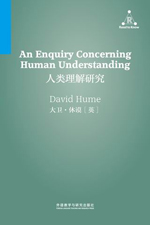人类理解研究
阿豆
Human Cognitive Abilities The study of human understanding focuses on
empiricist epistemology, including theories of ideas, causality, and
skepticism. It also includes ideas such as "miracles, providence,
and the afterlife. Hume called his philosophy "the science of
man," referring to the study of human nature as opposed to the
natural sciences, and therefore Hume also called this science "the
science of human nature. The so-called human nature here has a broad
meaning, which includes aspects related to human understanding, emotion,
interest, morality and ritual behavior. The term "science of human
nature" is in line with the rise of modern Enlightenment thinking
and the reverence and importance of human nature, and is also a
reflection of the trend that theoretical philosophy is about to
"break up" with natural science. In A Study of Human
Understanding, Hume analyzes human cognitive activity comprehensively
and points out that human cognitive ability is limited. His analysis of
philosophies including religion, atheism, and absolute skepticism leads
to his philosophy of "moderate skepticism," in which Hume, as
a moderate skeptic, argues that a reasonable reasoner should retain a
permanent degree of skepticism, caution, and humility in all his
investigations and assertions. A moderate skepticism or collegiate
philosophy can be both enduring and useful. Nor is the conclusion of
philosophy anything other than a systematic and revised reflection on
everyday life, and Hume points out that there are two aspects of the
inherent subject of science and research that one can come to: a
quantitative science, and the existence of actual and factual facts that
are based entirely on experience. Hume further pointed out that the best
and firmest foundation for theology is faith and divine revelation;
ethics and criticism are objects of interest and amusement, not of
understanding. The rest of the books contain nothing but sophistry and
fancy, except those which contain reasoning about number and quantity,
and those which contain inferences about real facts and the existence of
any experience, and then one can cast them into the fire. The book
argues that human understanding is very weak and the scope of
understanding is very narrow. But in the past, philosophy failed to
recognize this problem and often discussed things beyond human
understanding, which resulted in no unanimous understanding and gave
rise to many unnecessary arguments and the formation of different
schools of thought. If philosophers discuss issues within the scope of
human understanding, they will be free from many troubles and be happy.
Then, what is the capacity and scope of human understanding? To solve
this problem, the author critically draws on previous philosophies,
especially that of Beckley. He argues that sense perception is the only
object of people's awareness and the only existence. Even if people
focus their attention outside themselves, even if they trace their
imagination up to the heavens and as far as the extreme edge of the
universe, they will not go one step beyond themselves, nor will they get
other existences than their sense perceptions, which, as the objects of
people's knowledge, are divided into two categories, impressions and
ideas. By impressions, we mean people's current and immediate
sensations, which include all sensations, feelings and emotions that
first appear in the soul, which are strong and vivid, and are the source
of all ideas, and by ideas, which are copies of impressions, which are
reproductions of impressions in memory and imagination, which are weak
and obscure. In his view, the latter is not a qualitative leap to the
former, but a combination, a transposition, an enlargement and a
reduction of the former. Therefore, all philosophical propositions
should be judged and decided on the basis of sensory impressions, and
anything that cannot be reduced to sensory impressions should be
discarded as "delusion". In this way, the senses become the
only and ultimate source of knowledge, which "cannot establish any
direct relationship between the mind and the object", but is a
barrier, a wall, separating the consciousness from the external world,
apart from which nothing can be presented to the mind. This is the
author's most fundamental point of view. From this point of view, he
criticizes the philosophy of Beckley, who on the one hand asserts that
things are a "composite of sensations" and that nothing exists
outside of sensations, and on the other hand affirms that sensations are
produced by spiritual entities such as the ego and God. He asserts that
there are only sensations in the world, and that one cannot go beyond
sensations, and that it is unknowable whether there are other existences
beyond sensations. This rejects both materialist reflectionism and
idealist empiricism, taking a middle course between the two. The
connection between ideas The book also talks about the connection
between ideas, describing the relation of similarity, proximity, and
causation as the three principles of the connection between ideas, but
completely avoiding the connection between external things and ideas.
The book also divides rational objects into relations of ideas and
actual things. The mathematical disciplines such as geometry, algebra,
and trigonometry provide knowledge of the former relationship, which has
"intuitive certainty or demonstrable certainty", i.e., it can
be proved by intuition and reasoning, while the disciplines such as
physics provide knowledge of the latter relationship, which is only
contingent but not certain. According to the author, this knowledge is
"based on causality", which cannot be perceived directly. The
author also devotes a lot of space to arguing the point about causality.
According to the author, people usually say that there is a causal
relationship between two things because they feel that what is the cause
has some "power" to produce the result, and that there is a
"necessary connection" between the cause and the result. The
author points out that this so-called "power" and
"necessary connection" are not empirical, so it is not certain
that causality exists objectively outside of experience.



 京公网安备 11010802032529号
京公网安备 11010802032529号